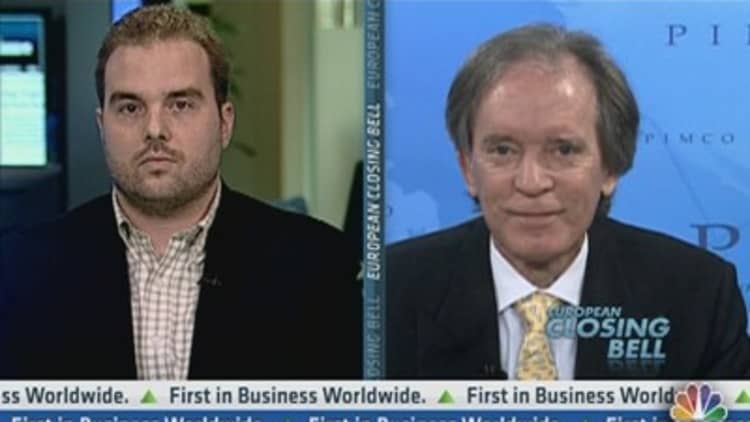The European Central Bank won't solve the euro zone's debt crisis as long as the European Union behaves like a "dysfunctional" family, Bill Gross, Pimco founder and co-chief investment officer, told CNBC on Tuesday.
The main problem is the split between North and South Europe, Gross said: The northern countries have low debt and are export oriented, while the southern economies' debt ratios are high and their economies are based more on domestic consumption.
"Their ability to get out from under that straightjacket I think is their biggest problem," he said, adding that a recent summit of European Union leaders had no significant contribution to solving the euro zone's problems.
"The EU's 16th summit was anything but sweet," he said. In Gross' opinion, Greece and Portugal are "increasingly on death rows…and Merkel speaks about austerity."
"This dysfunctional EU family remains just that," he added.
Gross advised investors to stay away from euro zone bonds, saying the fall in yields in recent weeks was mainly due to the ECB's massive liquidity injection, the long-term financing operation (LTRO) last December.

"At Pimco we're basically underweight the southern European countries," he said. "One would consider German Bunds to be slightly overvalued" because of the potential of crisis in the south of the continent, to which Germany is connected.
"The last few weeks have been a reflection of the liquidity provided by the LTRO. We have the suspicion that Italian banks are buying Italian debt," he said. "Ultimately it will take a lot of liquidity from the LTRO and future LTROs to stabilize Italy, to stabilize Spain going forward."
But the procedure is not without risks, Gross warned.
"It does provide liquidity and it kicks the can down the road for at least three years… it certainly allows those banks to buy and to support their own respective sovereign countries."
However, over the long term "there is no real way out for euro land other than to grow," he added.
Portugal, which this week has stepped into the limelight again as investors say it may be following into the footsteps of Greece, is a worry for Gross, who said the country's bonds were supported by the ECB.
"Portugal was purchased today in small amounts by the ECB and perhaps that lent a bit of a lift to 10-year prices," he said.
Gross does not expect the Federal Reserve to announce a decision to launch a third round of quantitative easing at its next meeting, but that it will happen "certainly before the end of June, which is the end of Operation Twist."
Operation Twist started in September 2011 and the Fed sold short-term Treasurys buying long-term bonds, to push long-term bond yields down.
There is currently no incentive for private investors to buy Treasurys and central banks will have to keep supporting their governments' debt until the private sector will come back, Gross said.
"We find yields very low and unattractive from a historical point of view … the best idea in the US would be to buy mortgage debt," he said. "We would be buying 2-3 percent yield in mortgage debt as a substitute for Treasury bonds and notes."


